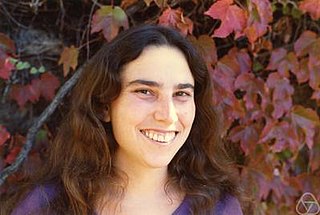Related Research Articles

Richard Peter Stanley is an Emeritus Professor of Mathematics at the Massachusetts Institute of Technology, in Cambridge, Massachusetts. From 2000 to 2010, he was the Norman Levinson Professor of Applied Mathematics. He received his Ph.D. at Harvard University in 1971 under the supervision of Gian-Carlo Rota. He is an expert in the field of combinatorics and its applications to other mathematical disciplines.
Joan Sylvia Lyttle Birman is an American mathematician, specializing in low-dimensional topology. She has made contributions to the study of knots, 3-manifolds, mapping class groups of surfaces, geometric group theory, contact structures and dynamical systems. Birman is research professor emerita at Barnard College, Columbia University, where she has been since 1973.

Chuu-Lian Terng is a Taiwanese-American mathematician. Her research areas are differential geometry and integrable systems, with particular interests in completely integrable Hamiltonian partial differential equations and their relations to differential geometry, the geometry and topology of submanifolds in symmetric spaces, and the geometry of isometric actions.
Lawrence David Guth is a professor of mathematics at the Massachusetts Institute of Technology.

Georgia McClure Benkart was an American mathematician who was known for her work in the structure and representation theory of Lie algebras and related algebraic structures. She published over 130 journal articles and co-authored three American Mathematical Society memoirs in four broad categories: modular Lie algebras; combinatorics of Lie algebra representations; graded algebras and superalgebras; and quantum groups and related structures.

Ruth Michele Charney is an American mathematician known for her work in geometric group theory and Artin groups. Other areas of research include K-theory and algebraic topology. She holds the Theodore and Evelyn G. Berenson Chair in Mathematics at Brandeis University. She was in the first group of mathematicians named Fellows of the American Mathematical Society. She was in the first group of mathematicians named Fellows of the Association for Women in Mathematics. She served as president of the Association for Women in Mathematics during 2013–2015, and served as president of the American Mathematical Society for the 2021–2023 term.

Brooke Elizabeth Shipley is an American mathematician. She works as a professor at the University of Illinois at Chicago, where she was head of the Department of Mathematics, Statistics and Computer Science from 2014 to 2022. Her research concerns homotopy theory and homological algebra.
Irina Mitrea is a Romanian-American mathematician who works as professor and department chair at the Department of Mathematics of Temple University. She is known for her contributions to harmonic analysis, particularly on the interface of this field with partial differential equations, geometric measure theory, scattering theory, complex analysis and validated numerics. She is also known for her efforts to promote mathematics among young women.
Rebecca Freja Goldin is an American mathematician who works as a professor of mathematical sciences at George Mason University and director of the Statistical Assessment Service, a nonprofit organization associated with GMU that aims to improve the use of statistics in journalism. Her mathematical research concerns symplectic geometry, including work on Hamiltonian actions and symplectic quotients.
Malabika Pramanik is a Canadian mathematician who works as a professor of mathematics at the University of British Columbia. Her interests include harmonic analysis, complex variables, and partial differential equations.

Megumi Harada is a mathematician who works as a professor in the department of mathematics and statistics at McMaster University, where she holds a tier-two Canada Research Chair in Equivariant Symplectic and Algebraic Geometry.
Hélène Barcelo is a mathematician from Québec specializing in algebraic combinatorics. Within that field, her interests include combinatorial representation theory, homotopy theory, and arrangements of hyperplanes. She is a professor emeritus of mathematics at Arizona State University, and deputy director of the Mathematical Sciences Research Institute (MSRI). She was editor-in-chief of the Journal of Combinatorial Theory, Series A, from 2001 to 2009.
Ling Long is a Chinese mathematician whose research concerns modular forms, elliptic surfaces, and dessins d'enfants, as well as number theory in general. She is a professor of mathematics at Louisiana State University.

Anne Schilling is an American mathematician specializing in algebraic combinatorics, representation theory, and mathematical physics. She is a professor of mathematics at the University of California, Davis.
Ruth I. Michler was an American-born mathematician of German descent who lived and worked in the United States. She earned her Ph.D. in Mathematics from the University of California, Berkeley, and she was a tenured associate professor at the University of North Texas. She died at the age of 33 while visiting Northeastern University, after which at least three memorial conferences were held in her honor, and the Ruth I. Michler Memorial Prize was established in her memory.
Julia Gordon is a mathematician at the University of British Columbia whose research concerns algebraic geometry, including representation theory, p-adic groups, motivic integration, and the Langlands program.
Melody Tung Chan is an American mathematician and violinist who works as Associate Professor of Mathematics at Brown University. She is a winner of the Alice T. Schafer Prize and of the AWM–Microsoft Research Prize in Algebra and Number Theory. Her research involves combinatorial commutative algebra, graph theory, and tropical geometry.
Rosa C. Orellana is an American mathematician specializing in algebraic combinatorics and representation theory. She is a professor of mathematics at Dartmouth College.
Anna Laura Mazzucato is a professor of mathematics, distinguished senior scholar, and associate head of the mathematics department at Pennsylvania State University. Her mathematical research involves functional analysis, function spaces, partial differential equations, and their applications in fluid mechanics and elasticity.
The Ruth I. Michler Memorial Prize is an annual prize in mathematics, awarded by the Association for Women in Mathematics to honor outstanding research by a female mathematician who has recently earned tenure. The prize funds the winner to spend a semester as a visiting faculty member at Cornell University, working with the faculty there and presenting a distinguished lecture on their research. It is named after Ruth I. Michler (1967–2000), a German-American mathematician born at Cornell, who died young in a construction accident.
References
- ↑ Birth year from Library of Congress catalog data, retrieved 2018-11-28.
- ↑ "Patricia Hersh | Department of Mathematics" . Retrieved 2020-04-29.
- 1 2 3 "Ruth I. Michler Prize 2010–2011". Association for Women in Mathematics . Retrieved 21 January 2021..
- 1 2 3 Curriculum vitae: Patricia L. Hersh (PDF), retrieved 29 April 2020.
- ↑ Patricia Hersh at the Mathematics Genealogy Project
- ↑ "AMS Committees". American Mathematical Society. Retrieved 2023-03-29.
- ↑ 2016 Class of the Fellows of the AMS, American Mathematical Society , retrieved 2015-11-17.